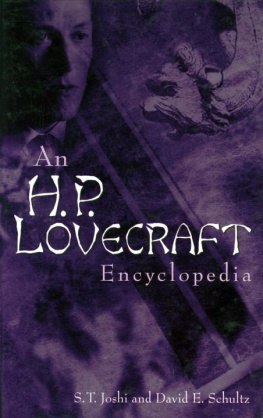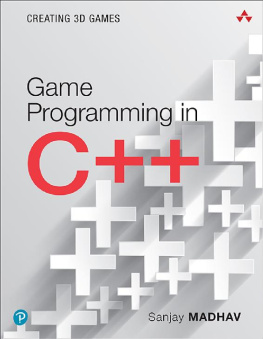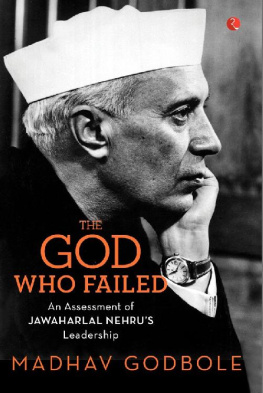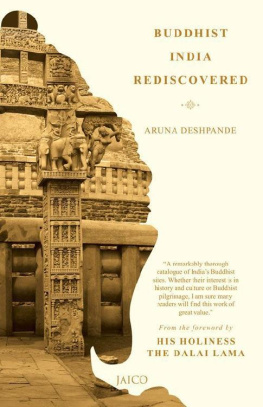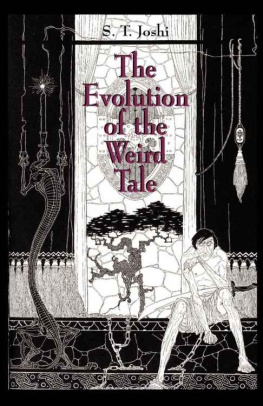Madhav M. Deshpande - Pāṇinian Studies: Professor S. D. Joshi Felicitation Volume
Here you can read online Madhav M. Deshpande - Pāṇinian Studies: Professor S. D. Joshi Felicitation Volume full text of the book (entire story) in english for free. Download pdf and epub, get meaning, cover and reviews about this ebook. year: 2020, publisher: University of Michigan Center for South and Southeast Asian Studies, genre: Art. Description of the work, (preface) as well as reviews are available. Best literature library LitArk.com created for fans of good reading and offers a wide selection of genres:
Romance novel
Science fiction
Adventure
Detective
Science
History
Home and family
Prose
Art
Politics
Computer
Non-fiction
Religion
Business
Children
Humor
Choose a favorite category and find really read worthwhile books. Enjoy immersion in the world of imagination, feel the emotions of the characters or learn something new for yourself, make an fascinating discovery.
- Book:Pāṇinian Studies: Professor S. D. Joshi Felicitation Volume
- Author:
- Publisher:University of Michigan Center for South and Southeast Asian Studies
- Genre:
- Year:2020
- Rating:5 / 5
- Favourites:Add to favourites
- Your mark:
- 100
- 1
- 2
- 3
- 4
- 5
Pāṇinian Studies: Professor S. D. Joshi Felicitation Volume: summary, description and annotation
We offer to read an annotation, description, summary or preface (depends on what the author of the book "Pāṇinian Studies: Professor S. D. Joshi Felicitation Volume" wrote himself). If you haven't found the necessary information about the book — write in the comments, we will try to find it.
Pāṇinian Studies: Professor S. D. Joshi Felicitation Volume — read online for free the complete book (whole text) full work
Below is the text of the book, divided by pages. System saving the place of the last page read, allows you to conveniently read the book "Pāṇinian Studies: Professor S. D. Joshi Felicitation Volume" online for free, without having to search again every time where you left off. Put a bookmark, and you can go to the page where you finished reading at any time.
Font size:
Interval:
Bookmark:

The University of Michigan Center for South and Southeast Asian Studies
MICHIGAN PAPERS ON SOUTH AND SOUTHEAST ASIA
Ann Arbor, Michigan
PINIAN STUDIES
Professor S. D. Joshi Felicitation Volume
edited by
Madhav M. Deshpande
Saroja Bhate
CENTER FOR SOUTH AND SOUTHEAST ASIAN STUDIES
UNIVERSITY OF MICHIGAN
Number 37
Open access edition funded by the National Endowment for the Humanities/Andrew W. Mellon Foundation Humanities Open Book Program.
Library of Congress catalog card number: 90-86276
ISBN: 0-89148-064-1 (cloth)
ISBN: 0-89148-065-X (paper)
Copyright 1991
Center for South and Southeast Asian Studies The University of Michigan
All rights reserved
Printed in the United States of America
ISBN 978-0-89148-064-8 (hardcover)
ISBN 978-0-89148-065-5 (paper)
ISBN 978-0-472-12773-3 (ebook)
ISBN 978-0-472-90169-2 (open access)
The text of this book is licensed under a Creative Commons Attribution-NonCommercial-NoDerivatives 4.0 International License: https://creativecommons.org/licenses/by-nc-nd/4.0/
Madhav M. Deshpande
Professor Shivram Dattatray Joshi was born in Konkan in the town of Ratngiri on August 15, 1926. He was born into a family of Sanskrit Pandits. His father and his uncle were both Sanskrit Pandits dedicated to the tradition of Vykaraa. His father died when Shivram was still a child, and he was sent to Pune to stay with his uncle, Maheshwar Shastri Joshi, who taught Sanskrit at the Poona Sanskrit College in Datewadi near the Bhikardas Maruti temple in Sadashiv Peth. Under the guidance of his uncle, Shivram became a master of Sanskrit Vykaraa at a very early age. He passed the Vykaraa-Trtha examination of the Bengal Sanskrit Association in 1941 at the age of fifteen. He passed the Vykaraottarm examination from Baroda in 1942; the Vykaraa-Cmai examination of the Vedastrottejaka Sabh, Pune, in 1944; and the Vykaracrya examination of the Poona Sanskrit College in 1945. Having become a recognized teacher of Sanskrit in Pune before reaching the age of twenty, he began teaching at the Poona Sanskrit College. While he thus pursued the path of traditional Sanskrit scholarship, other boys of his age went to English schools and colleges. The financial rewards for teaching Sanskrit were meager at best, and the young scholar and his During this period, S. D. Joshi became a well-known teacher of Sanskrit in Pune, and many college students and even college teachers began studying with him. He was the principal of the Poona Sanskrit College from 19471955.
This was the situation when Professor D. H. H. Ingalls of Harvard University came to Pune in the early fifties. He wished to read Sanskrit grammatical texts with a Pandit, and the young S. D. Joshi was recommended to him by Dr. V. G. Paranjpe and Mahamahopadhyaya Kashinath Shastri Abhyankar. S. D. Joshi, who had never studied English, read these texts with Ingalls using Sanskrit as the medium of conversation. Ingalls soon recognized a brilliant mind and could see that, if his traditional learning were augmented by western training in critical methods, Joshi would become a scholar of unequaled abilities. With this realization, Ingalls encouraged Joshi to get his B.A. in Sanskrit and then to apply for a scholarship to go to Harvard for a Ph.D.
At this stage Joshi decided to finish the high school matriculation examination. In 1955 he received his B.A. in Sanskrit from the University of Poona. Although he was officially a student in their classes, his professors of Sanskrit were well aware of Joshi's exceptional abilities and often modified their views in accordance with his suggestions. It was during his college days, that my father, Murlidhar Vasudeo Deshpande, became his classmate. Initially my father was unaware of the fact that S. D. Joshi was already an accomplished scholar and teacher. To him he was just a close friend. One day, Joshi took him to Poona Sanskrit College. My father mentioned that there was said to be a very learned teacher, called Panditji, in that college and that he would very much like to meet him. After some time, Joshi revealed the fact that he was that Panditji. I was just a child at the time, yet I distinctly remember my father's excitement. Panditji has remained a close friend to my father and a dear uncle (kk) to me. He took me to my first restaurant in Pune. This was before he went to America to do his Ph.D.
After getting his B.A. in Sanskrit, S. D. Joshi was awarded a fellowship to study at Harvard. He went that same year. I still remember the long conversations he and my father had before he left. After some time at Harvard, he returned to Pune and married one of his college classmates, Kalavati Bhagwat, on June 22, 1958. After the birth of his son, Anandavardhan, he returned to Harvard and in 1960 finished his doctoral dissertation on Kauabhaa's Dhtvarthaniraya under the guidance of Professor Ingalls.
After returning to Pune in 1960, S. D. Joshi joined the Department of Sanskrit Dictionary at the Deccan College. In 1964, he joined the Centre of Advanced Study in Sanskrit at the University of Poona as a Reader in Sanskrit. In 1970, he became Professor and Head of the Department of Sanskrit and Prakrit Languages. From 1974 to 1987, he served as Director of the Centre of Advanced Study in Sanskrit. Since 1987, he has been the General Editor of the Sanskrit Dictionary Project at the Deccan College. In 1971-72, he was a visiting professor at Harvard, and in 1976-77, a visiting professor at Nagoya University, Japan. He has visited and lectured at numerous universities in and out of India. He is currently the General Secretary of the All India Oriental Conference. Among the numerous honors he has received, we would like to mention the most recent one. Professor Joshi received an award from the President of India on August 15, 1991, as a Rrya Pita (National Scholar).
It was S. D. Joshi who inspired and encouraged me to join the field of Sanskrit studies. He did this by both his advice and his example. But, beyond our personal relationship, I honor and respect him as a teacher. During the two years (19661968) when I was studying for my master's degree in Sanskrit at Pune, Professor Joshi taught me more than I could have learned in twelve years with another teacher. Besides the two scheduled hours per week, he invited his class to his home every evening. During these long sessions, he explained to us in meticulous detail the intricate arguments in the Mahbhya and the Paribh-enduekhara. It was an unparalleled saturation and transmission of knowledge, a gift from a teacher to his students, one that cannot be matched. Many generations of students have experienced this same generosity, which was complemented almost daily by the hospitality of Mrs. Joshi.
Saroja Bhate and I decided to jointly edit this felicitation volume because we feel great love, affection, and gratitude toward Professor Joshi. In the past, he has shunned most public displays of honor and tried his best to discourage us from going ahead with this work. We strongly believe, however, that the world of Sanskrit scholarship must have an opportunity to express its respect, gratitude, and admiration for his contributions as a teacher and a scholar. By serving as the coeditors of this volume, we Let me conclude this preface by quoting a verse from the atalok of akarcrya.

Font size:
Interval:
Bookmark:
Similar books «Pāṇinian Studies: Professor S. D. Joshi Felicitation Volume»
Look at similar books to Pāṇinian Studies: Professor S. D. Joshi Felicitation Volume. We have selected literature similar in name and meaning in the hope of providing readers with more options to find new, interesting, not yet read works.
Discussion, reviews of the book Pāṇinian Studies: Professor S. D. Joshi Felicitation Volume and just readers' own opinions. Leave your comments, write what you think about the work, its meaning or the main characters. Specify what exactly you liked and what you didn't like, and why you think so.

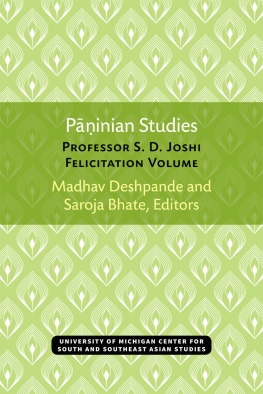


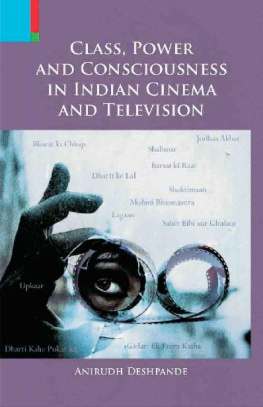
![Madhav Deshpande - Critical Studies in Indian Grammarians I: The Theory of Homogeneity [Sāvarṇya]](/uploads/posts/book/255206/thumbs/madhav-deshpande-critical-studies-in-indian.jpg)
